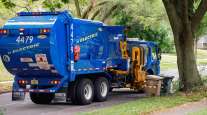Bipartisan Opposition Mounts to Wisconsin Governor's Proposed DOT Budget

Wisconsin’s Legislature doesn’t meet again until January, but some of its key transportation players as well as outside stakeholders are going public now with their strong opposition to Gov. Scott Walker’s announced 2017-19 budget for the Department of Transportation. They don’t think Walker’s proposal will come close to addressing a funding shortfall which has soared to $939 million.
Walker touted increases of 4.7% in transportation funding for municipalities and 8.1% for counties in the DOT budget that was released Sept. 15.
“This budget provides more funding to local governments for their roads and bridges, keeps borrowing at historically low levels and maintains our no-tax or fee-increase pledge,” Walker said. “Good roads and bridges are important to Wisconsin and our economy, and this budget proves you don’t have to raise taxes or fees to maintain a safe and strong transportation network.”
Not according to Rep. John Nygren, chairman of the Joint Committee on Finance and Walker’s fellow Republican.
“To the governor’s credit, he’s at least being up front, but I don’t see a willingness or the guts to address the issue,” Nygren told Transport Topics. “Borrowing’s not the answer. It’s OK in the short-term because interest rates are good, but a lot of our revenue dollars are going to debt service instead of transportation projects. We’re not talking about building new highways. We’re basically talking about rebuilding infrastructure that was built 50 years ago, and in most cases its foundation is crumbling.”
A self-described fiscal conservative, Nygren said that all options have to be on the table, including fuel tax increases, hikes in registration fees, the introduction of tolls and delaying projects. Walker has ruled out any new revenues.
“I’m up for election in November [unlike Walker], and there’s a risk for me talking about this now, but I believe it’s the right thing to do,” Nygren added.
The Wisconsin Motor Carriers Association also wants to keep all transportation funding options open.
“The state Assembly — led by Speaker [Robin Vos], Majority Leader [Jim Steineke] and [Nygren] — has more or less drawn a line in the sand challenging the governor, saying everything — including tolls — should be discussed, and we support that,” WMCA President Neal Kedzie said. “The governor has threatened to veto anything that comes across his desk that includes [new revenues], and that’s not a good way to start the discussion.”
Nygren said that Senate Republicans “aren’t there yet” on transportation funding although they have “more willingness to take this on” than does Walker.
"Wisconsin’s road needs are well-documented, and there is clear bipartisan support for a long-term, sustainable solution to address our aging infrastructure,” said Pat Goss, executive director of the Wisconsin Transportation Builders Association, one of the members of the newly formed Coalition of Highway Users along with WMCA.
Sen. Tim Carpenter, a Democrat who serves on the Transportation Committee, is a part of that bipartisan support.
“We need to try to come up with a very reasonable DOT budget,” Carpenter said. “I want to see something happen rather than just kicking the can down the road again. I think it has to happen. [Many] other states have raised revenues to pay for transportation. The average driver in Milwaukee County pays $600 a year to repair their cars because of poor roads.”
Walker’s 2015-2017 DOT budget cut the highway expansion program by 32%, the highway rehabilitation program by 7% and the base funding for the freeway megaproject in Greater Milwaukee by 83%.
“The delay of some of these projects by at least two years creates a stranglehold on the … flow of freight in those major corridors, which is really not acceptable,” Kedzie said. “Our job creation has been very stagnant. We need very good infrastructure to encourage companies to come set up shop in Wisconsin.”
Please read this column and pass it on: "Scott Walker: Transportation budget strengthens state’s infrastructure"https://t.co/WBo85fiRPn — Scott Walker (@ScottWalker) September 18, 2016




